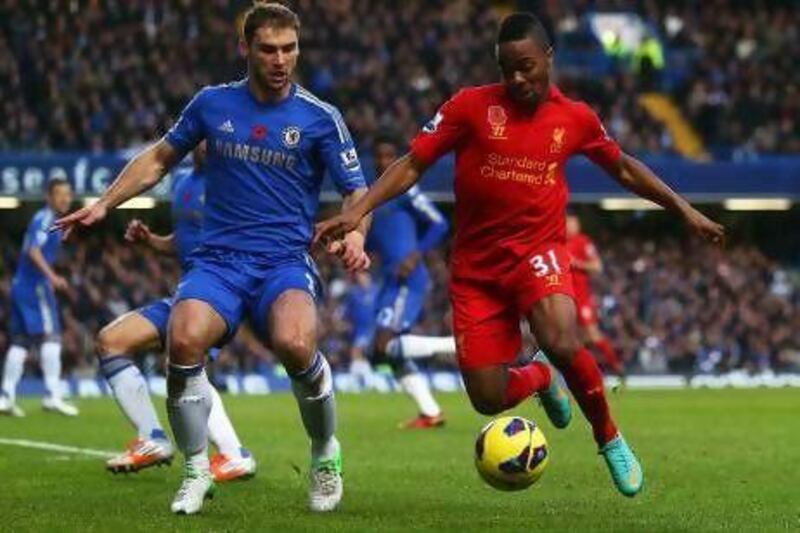It was just over a week ago, on the eve of the day when most Americans went to the polls, when Mitt Romney made his final address. "Tomorrow, we begin a new tomorrow," he said. "Tomorrow, we begin a better tomorrow."
Perhaps confused by his rhetoric, the majority of voters decided they did not share Romney's vision of tomorrow. Rather than leading the Republicans to the White House, the presidential candidate remains in the wilderness.
But such can be the fate of those forever talking about tomorrow. They risk being branded false prophets. It is the accusation directed at Arsene Wenger. However futuristic his plans, many weary Arsenal fans have concluded that tomorrow bears distinct similarities to today. It is a place where promising players show skill but a team never quite reaches its potential, partly because their star players are invariably sold.
Brendan Rodgers is Liverpool's tomorrow man. The criticism being levelled at him is that today is remarkably reminiscent of yesterday.
Liverpool took 18 points from their last 19 games under Kenny Dalglish and have procured 12 from their first 11 of Rodgers's reign.
The draw at Chelsea on Sunday represented the best result of Rodgers's time at Anfield. While many among the fan base display Liverpool's traditional patience, a minority are growing unsettled and strangely nostalgic. If results were going to be underwhelming, it appears, some would prefer mediocrity under the legendary Dalglish.
There is a depressing predictability to it.
Given the demanding early fixtures list, it was always possible Liverpool would be slow starters. The Rodgers brand of football was never going to be adopted overnight. Factor in a couple of ill-timed injuries, to Lucas Leiva and Fabio Borini, and their record is understandable.
But it is one to separate the optimists from the pessimists.
For the former, Liverpool are unbeaten in six league games. For the latter, they have won only two in 11, both against sides possibly headed for relegation.
Both camps have a point. On occasion, Liverpool look close to being a very good side. On others, they appear miles away.
The broader issue, though, is that it will take time for Rodgers's vision of tomorrow to be realised. The Northern Irishman has said the rebuilding job won't be complete when his three-year contract expires in 2015.
Most managers try to buy themselves a period of grace in an industry where short-termism is almost institutionalised, and his case is particularly strong.
It is not always necessary to go backwards before you go forwards, but Liverpool did. They regressed alarmingly in the second half of last season. Then the summer brought the departures of four big earners and, more pertinently, potential goalscorers in Dirk Kuyt, Maxi Rodriguez, Craig Bellamy and Andy Carroll. With the other deals out of his hands, Rodgers can be faulted only for the exit of Carroll, the £35 million (Dh206.5m) man. Blame for the transfer-deadline day fiasco, when Liverpool failed to sign a striker, is certainly not his alone.
A lack of productivity was an inevitable consequence. But given the accusation Liverpool can take 25 passes to go nowhere, it adds to a general critique. This is branded passing for passing's sake, lacking incision or invention.
Joe Allen is Rogders's best buy, and has been impressive, overall. He had perhaps his poorest game so far at Stamford Bridge, but that was an individual failing, not the ethos. And shorn of scorers, with the notable exception of Luis Suarez, passing at least serves as a method of damage limitation.
If Liverpool's leveller at Stamford Bridge was uncharacteristic, coming from a corner and featuring Jamie Carragher's first assist for three-and-a-half years, the build-up was significant.
The corner was won by the persistence of the 19-year-old Andre Wisdom and taken by the 18-year-old Suso, making his second influential cameo in four days after excelling against Anzhi Makhachkala. The 17-year-old Raheem Sterling has gone from fringe player to cornerstone of the team in the space of three months.
This is where Rodgers's talk of tomorrow gains credence. Sterling's star has shone so brightly that his promotion generates no controversy. Suso's performances on the flanks have been more mixed.
Rodgers's treatment of Stewart Downing and Jordan Henderson has been somewhat political; the £36m duo, inherited from Dalglish, have a solitary league start between them.
But the thinking in selecting Suso is evident. There are no guarantees, but the Spaniard might become a world-class player. Downing, almost a decade his senior, has never been one and never will be.
Blooding youngsters is no simple task. The Merseyside derby, with its traditional intensity, rather passed Suso by. The pragmatic response would have been to use the more-experienced alternatives, such as Downing or Joe Cole, for the high-pressure game at Stamford Bridge.
Rodgers didn't take waver and reaped a reward. Even with it, Liverpool lie 13th in the league table. It is a cause of unrest.
The outlook for today remains gloomy but, for those willing to look far enough into the future, there are the hints that "tomorrow" might someday arrive.
Follow us
[ @SprtNationalUAE ]






